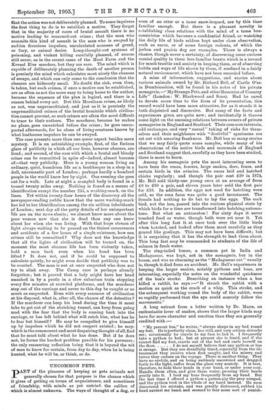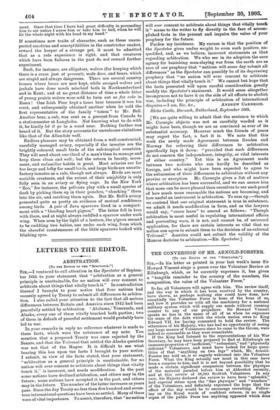constrictor which - becomes a confidential friend, or 'watching the daily
life of birds seldom kept under close observation, such as emus, or of some foreign rodents, of which the jerboa and prairie dog are examples. There is always a chance, though never a certainty, of discovering some curious
mental quality in these less familiar beasts which is a reward for much trouble and anxiety in keeping them, or of observing habits and ways of life shown by them, if confined in a. fairly natural environment, which have not been recorded before.
A mine of information, suggestions, and stories about various animals owned by Mr. Richard Bell, of Castle O'er, in Dumfriesshire, will be found in his notes of his private menagerie,—" My Strange Pets, and otherMemories of Country Life" (London : W. Blackwood and Sons). Had be cared to devote more time to the form of its presentation, this record would have been more attractive, for as it stands it is both disjointed and discursive. But many of the facts and experiences given are quite new; and incidentally it throws some light on the amusing relations between owners of private menageries in England and Scotland. Their common interests, odd exchanges, and very " casual " taking of risks for them- selves and their neighbours with " doubtful " specimens are set out with amazing frankness. Mr. Bell has so many stories that we may fairly quote some samples, while many of his observations of the native birds and mammals of England and Scotland suggest that, carefully as they have been studied, there is more to learn.
Among his menagerie pets the most interesting seem to have been the emus, lemurs, large snakes, deer, foxes, and certain birds in the aviaries. The emus laid and hatched chicks regularly ; and though the pair cost £20 in 1874, Mr. Bell sold thirty-one young ones at an average of from £8 to £10 a pair, and eleven years later sold the first pair for £18. In addition, the eggs not used for hatching were sold, so the emu farm was quite a good investment The female had nothing to do but to lay the eggs. The cock bird, not the hen, passed into the curious physical state by which birds for a time are transformed into hatching automa- tons. But what an automaton ! For sixty days it never touched food or water, though both were set near it. Yet after this long fast it at once took over the little birds when hatched, and looked after them most carefully as they grazed like goslings. This may not have been difficult; but it is surprising that it has the strength to lead them about.
This long fast may be commended to students of the life of salmon in fresh water.
The ring-tailed lemur, a common pet in India and Madagascar, was kept, not in the menagerie, but in the house, and was as charming as the "Madagascar cat " usually is, though it died from an accident. Mr. Bell's experiences in keeping the larger snakes, notably pythons and boas, .are interesting, especially the notes on the wonderful quickness of the boa's stroke. Describing an instance when a boa killed a rabbit, he says :—" It struck the rabbit with a motion as quick as the crack of a whip. This stroke, and the subsequent working round the body of the rabbit, were so rapidly performed that the eye could scarcely follow the movements."
A long extract from a letter written by Dr. Mann, an enthusiastic lover of snakes, shows that the larger kinds may have far more character and emotion than they are generally credited with :-
" My present boa," he writes, " always sleeps in my bed round my feet. He is perfectly clean, lies still, and very seldom disturbs me ; occasionally he crawls to my face to lick it. I frequently take a python to bed ; but at present she is timid, and if she cannot find my feet, crawls out of the bed and curls herself on the floor I do not myself believe that any python or boa is savage. But they are dreadfully timid, especially from the ill- treatment they receive when first caught, and the misery and terror they endure on the voyage. There is another thing. They have no eyelids, and on being suddenly uncovered and dragged forth to the light, suffer from the glare very acutely. It is best, therefore, to hide their heads in your hand, or under your coat. Handle them often, and give them water, pressing their heads gently into it. I feed my boas frequently from my hand. But the last time I offered a python a guinea-pig the prey escaped, and the python took in the whole of my hand instead. He soon discovered his mistake, and was greatly distressed, rubbed his head against my hand, and seemed to fear some sort of punish- ment. Since that time I have had great difficulty in persuading him to eat unless I nurse him or take him to bed, when he will lie the whole night with his head in my hand."
If sometimes new traits of character, such as these unsus- pected emotions and susceptibilities in the constrictor snakes, reward the keeper of a strange pet, it must be admitted that as a rule experience is right, and that creatures which have been failures in the past do not reward further experiment.
Such, for instance, are alligators, wolves (for keeping which there is a craze just at present), male deer, and bears, which are stupid and always dangerous. There are several country houses where bears are now kept, while escaped wolves and jackals have done much mischief both in Northumberland and in Kent; and at no great distance of time a whole litter of young prairie wolves were sold to turn out as fox cubs in Essex ! One Irish Peer kept a tame bear because it was his crest, and subsequently obtained another when he sold the first representative of the family " totem " to Mr. Bell. Another bear, a cub, was sent as a present from Canada to a stationmaster at Langholm. Not knowing what to do with it, he kindly let it go in a wood near. Nothing further was beard of it. But the story accounts for unwelcome visitations like that of the Allandale wolf.
Endless pleasure may be obtained from a well-constructed, carefully managed aviary, especially if the inmates are the brightly coloured small birds of the sub-tropical countries. They will need about one-third of a man's time to manage and keep them clean and well ; but the return in beauty, move- ment, and unfamiliar habits is great. Most aviaries are far too large and lofty for small birds, and large birds are unsatis- factory inmates as a rule, though not always. Birds are most sociable creatures, and the extent of their amiability is only fully seen in an aviary or flying cage. In the New York " Zoo," for instance, the pelicans play with a small species of duck by picking them up in their pouches, " chucking " them into the air, and catching them again. But Mr. Bell's aviary presented quite as pretty an evidence of mutual confidence among birds. A pair of Java sparrows lived in a compart- ment with a "bleeding heart pigeon." The latter fell in love with them, and at night always cuddled a sparrow under each wing. When seen by the light of a lantern, the pigeon seemed to be cuddling two babies, one under each wing, from which the cheerful countenances of the little sparrows looked with blinking eyes.











































 Previous page
Previous page